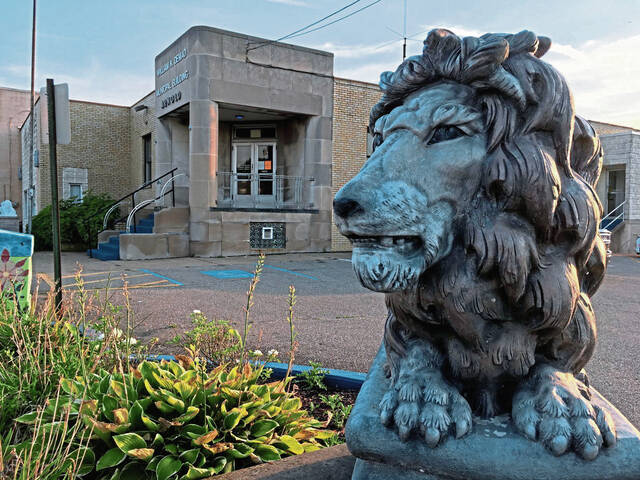Arnold officials consider joining Westmoreland land bank to fight blight
Joining the Westmoreland County Land Bank holds appeal for Arnold officials who see it as a boost to its battle against blight.
However, as is the case for its sister city, New Kensington, whether Arnold joins depends on the New Kensington-Arnold School District joining it, too.
Representatives from the land bank spoke at the last New Kensington-Arnold School Board meeting to provide district officials with information about the initiative, Superintendent Chris Sefcheck said.
Officials and school board members have not yet had the opportunity to talk it over, he said, but plan to do so ahead of their next meeting. The proposal to join the land bank could appear on the school board’s June regular meeting agenda, he said.
“We are all in for doing everything on our part to revitalize the district and the community,” he said. “That’s our metric. So if the land bank is going to help us revitalize the district and the community, we’re going to have to weigh that.”
The land bank, established in 2013, is a public agency that identifies, researches, demolishes and rehabilitates blighted properties while working in conjunction with municipalities.
At its meeting Tuesday, Arnold Council heard a presentation from Brian Lawrence, the land bank’s director, but, with council members Phillip McKinley and Adam Zweig absent, took no action.
“If the school district goes along with it, then I will make a motion to go along with it,” Councilman George Hawdon said.
Last month, New Kensington Council voted to join the land bank, but its approval is moot if the school board does not vote to join.
The reason being that the school district is one of the local taxing bodies. Arnold and New Kensington would each pay a $5,000 membership fee to the land bank, but the school district is exempt from that fee.
But additional conditions must be agreed to by the district as well as the municipalities. They include agreeing to pay 50% of the real estate taxes on a property to the land bank after it is transferred back onto the tax rolls and to exonerate tax liens that can act as an obstacle to the sale of a property.
Lawrence noted many of these blighted properties either have no owners interested in keeping the taxes current and maintaining the properties or an owner does not exist or cannot be found. That being the case, the properties deteriorate and the tax liens they carry do little to recoup delinquent taxes.
“These taxes, for the most part, are taxes not coming back,” Lawrence said.
“We have to make these places livable and healthy to live in,” he said.
Arnold officials have been focused on eliminating blight for about 10 years and have allocated money from the city’s federal funding to pay for demolition of blighted and condemned structures.
Community Development Director Rick Rayburg said 95% of the properties the city has demolished were acquired through the Westmoreland County Real Estate Repository. Properties end up in the repository after going unsold in sheriff’s sales and then judicial sales.
The city has sold some of the properties to people who indicate a desire to rehabilitate them but sets conditions to make sure that work is done.
The land bank acts in a similar fashion.
“The judicial free and clear sales is where we acquire most of our properties, but we also accept donations,” Lawrence said.
“We work with municipal officials to determine their priorities,” he said, referring to community development.
He said the agency has powers that municipalities do not, which can help avoid unnecessary and costly tax sales. They include the ability to eliminate liens and the power to shut out from the bidding process real estate speculators or would-be developers who lack either the intent to fully rehabilitate a property or the wherewithal in knowledge and finances to do that.
Municipal officials throughout the Alle-Kiski Valley often have complained about out-of-state buyers who buy deteriorating properties hoping to sell them for a profit and do little or nothing with them. Ultimately, the municipality is forced to take them before a district justice for code violations, place them up for sheriff’s sale and finally condemnation proceedings.
Lawrence said if the land bank indicates it wants a property, it is removed from public bidding — something that often angers prospective bidders.
He said such bidders can seek to acquire the property from the land bank.
“They could if they wanted to, but they have to be qualified,” Lawrence said, adding that they would have to state what they intend to do with the property, show building plans and the financial resources to do what they say.
If a bidder does not follow through on all that, the land bank can reclaim the property.
“We have exercised that ‘reverter’ clause where we’ve taken the property back from people who didn’t do what they said they’d do,” Lawrence said.
“I see it as a tool,” said Hawdon, adding that the city also would continue using the repository. “If we can get a property before it slides into blight, if we can rehab a property before it falls into blight, they can do it.”
Arnold Mayor Joseph Bia likes the land bank concept.
“If they can break that cycle where a property goes through the process two or three times, that helps,” Bia said. “I really don’t see any drawbacks based on their information.”
“I think that $5,000 would be money well spent,” Hawdon said.
Remove the ads from your TribLIVE reading experience but still support the journalists who create the content with TribLIVE Ad-Free.

